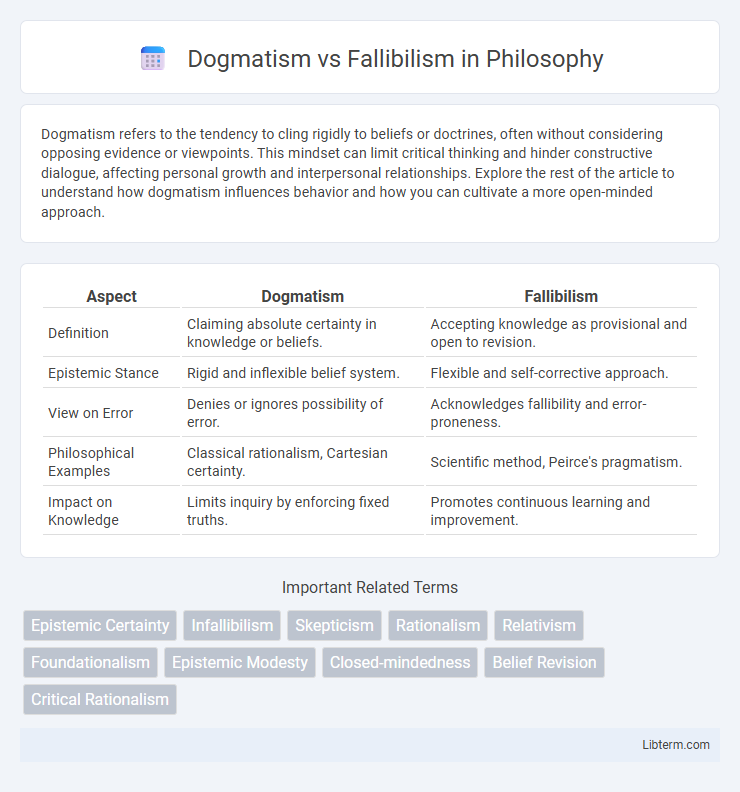Dogmatism refers to the tendency to cling rigidly to beliefs or doctrines, often without considering opposing evidence or viewpoints. This mindset can limit critical thinking and hinder constructive dialogue, affecting personal growth and interpersonal relationships. Explore the rest of the article to understand how dogmatism influences behavior and how you can cultivate a more open-minded approach.
Table of Comparison
| Aspect | Dogmatism | Fallibilism |
|---|---|---|
| Definition | Claiming absolute certainty in knowledge or beliefs. | Accepting knowledge as provisional and open to revision. |
| Epistemic Stance | Rigid and inflexible belief system. | Flexible and self-corrective approach. |
| View on Error | Denies or ignores possibility of error. | Acknowledges fallibility and error-proneness. |
| Philosophical Examples | Classical rationalism, Cartesian certainty. | Scientific method, Peirce's pragmatism. |
| Impact on Knowledge | Limits inquiry by enforcing fixed truths. | Promotes continuous learning and improvement. |
Understanding Dogmatism: Definition and Origins
Dogmatism is characterized by the rigid adherence to beliefs without considering opposing evidence or viewpoints, often rooted in an unwavering commitment to authoritative doctrines. This epistemological stance originates from philosophical traditions that emphasize certainty and absolute truth, such as certain interpretations of scholasticism and religious fundamentalism. Understanding dogmatism involves examining its psychological and cultural underpinnings that contribute to resistance against doubt and critical inquiry.
What is Fallibilism? Core Principles Explained
Fallibilism is the philosophical principle that human knowledge is inherently imperfect and subject to revision based on new evidence or reasoning. It emphasizes the acceptance of uncertainty and the ongoing possibility of error in beliefs, contrasting with dogmatism, which asserts absolute certainty in one's views. Core principles of fallibilism include openness to criticism, the provisional nature of knowledge, and the commitment to continual inquiry and improvement of understanding.
Historical Background: Dogmatism and Fallibilism in Philosophy
Dogmatism, rooted in ancient Greek philosophy, particularly in Plato's works, asserts that certain knowledge is attainable with absolute certainty, influencing scholastic traditions in medieval philosophy. Fallibilism emerged prominently in the 17th century through thinkers like Francis Bacon and later Charles Sanders Peirce, emphasizing that human knowledge is inherently uncertain and subject to revision. This philosophical evolution marked a shift from rigid certainty to a more scientific approach that embraces error correction and continuous inquiry.
Key Differences: Dogmatism vs Fallibilism
Dogmatism asserts absolute certainty in beliefs, rejecting the possibility of error or revision, while fallibilism acknowledges that knowledge is inherently uncertain and subject to revision based on new evidence. Dogmatism often results in rigid thinking and resistance to alternative viewpoints, whereas fallibilism promotes open-mindedness and continual inquiry. The fundamental difference lies in dogmatism's claim of infallibility versus fallibilism's acceptance of human cognitive limitations and the provisional nature of knowledge.
The Psychological Roots of Dogmatic Thinking
Dogmatic thinking often stems from a psychological need for cognitive closure and certainty, which helps reduce anxiety in uncertain situations. This rigidity is linked to cognitive biases such as confirmation bias and the need for epistemic security, driving individuals to reject conflicting evidence. Neuropsychological studies show that dogmatism correlates with reduced tolerance for ambiguity and heightened threat perception, reinforcing inflexible belief systems.
Fallibilism in Scientific Inquiry and Progress
Fallibilism in scientific inquiry emphasizes that all knowledge is provisional and subject to revision in light of new evidence or better explanations. This approach fosters continuous critical evaluation, encouraging scientists to test hypotheses rigorously and update theories rather than hold them as absolute truths. By acknowledging uncertainty, fallibilism drives scientific progress through adaptive learning and the refinement of understanding across disciplines.
Dogmatism’s Impact on Society and Debate
Dogmatism limits open discourse by enforcing rigid belief systems that discourage questioning and critical thinking, which hampers societal progress and innovation. This inflexible attitude fosters polarization, as opposing views are often dismissed outright, reducing opportunities for constructive debate and mutual understanding. The societal consequences of dogmatism include social fragmentation and the suppression of diverse perspectives essential for healthy democratic processes.
The Benefits of Embracing Fallibilism
Embracing fallibilism fosters intellectual humility and openness to new evidence, which enhances critical thinking and adaptive learning. This approach minimizes cognitive biases and dogmatic rigidity, promoting continuous improvement in knowledge and decision-making. By accepting the possibility of error, individuals and societies cultivate a culture of constructive dialogue and scientific progress.
Navigating Beliefs: Balancing Certainty and Open-Mindedness
Navigating beliefs requires balancing dogmatism's rigid certainty with fallibilism's embrace of uncertainty and open-minded inquiry. Dogmatism can provide cognitive stability but risks intellectual stagnation, while fallibilism fosters adaptability by recognizing the possibility of error. Effective belief systems integrate confidence with a willingness to revise views in light of new evidence, promoting intellectual humility and continuous learning.
Dogmatism vs Fallibilism: Practical Applications in Everyday Life
Dogmatism, characterized by rigid certainty in beliefs, often limits open-mindedness and adaptability in daily decisions, whereas fallibilism embraces uncertainty, promoting continuous learning and correction of errors. In practical settings like workplace collaboration or personal relationships, fallibilism encourages constructive dialogue and flexible problem-solving, enhancing outcomes and reducing conflicts. Embracing fallibilism fosters resilience and growth by acknowledging mistakes, while dogmatism may hinder progress through resistance to new information or perspectives.
Dogmatism Infographic

 libterm.com
libterm.com